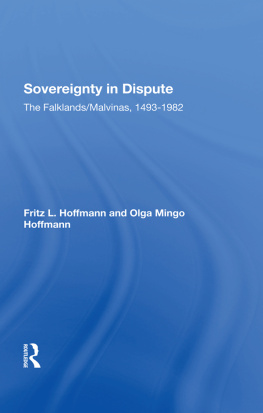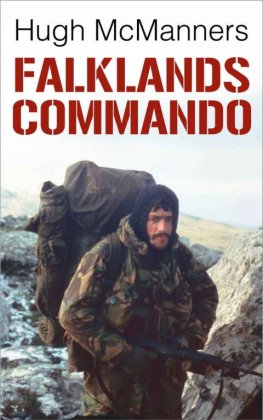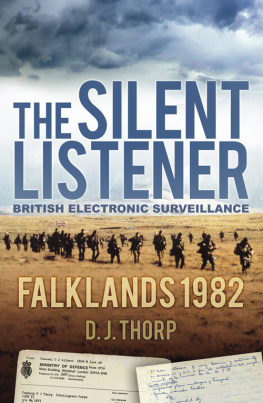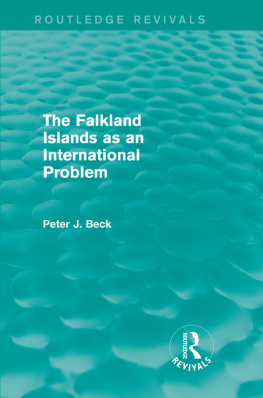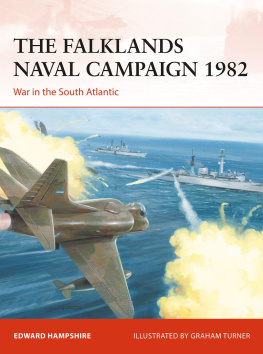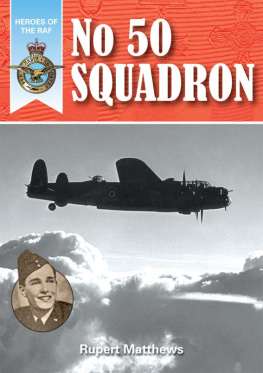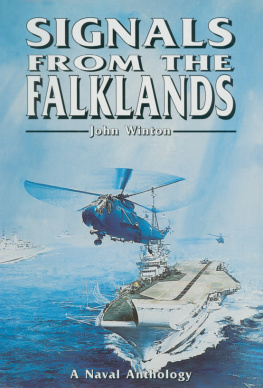Sovereignty in Dispute
Also of Interest
Military Lessons of the Falkland Islands War: Views from the United States, edited by Bruce W. Watson and Peter M. Dunn
The Exclusive Economic Zone: A Latin American Perspective, edited by Francisco Orrego Vicuna
Latin American Foreign Policies: Global and Regional Dimensions, edited by Elizabeth G. Ferris and Jennie K. Lincoln
Latin America, Its Problems and Its Promise: A Multidisciplinary Introduction, edited by Jan Knippers Black
Latin America and the U.S. National Interest: A Basis for U.S. Foreign Policy, Margaret Daly Hayes
FOREIGN POLICY on Latin America, 19701980, edited by the staff of Foreign Policy
The Caribbean Challenge: U.S. Policy in a Volatile Region, edited by H. Michael Erisman
Controlling Latin American Conflicts: Ten Approaches, edited by Michael A. Morris and Victor Milln
Available in hardcover and paperback.
Westview Special Studies on Latin America and the Caribbean
Sovereignty in Dispute: The Falklands/Malvinas, 14931982
Fritz L. Hoffmann and Olga Mingo Hoffmann
The Falkland (or Malvinas) Islandsa peaceful haven for land and sea birds and once a profitable paradise for whalers and seal hunterserupted into the headlines on April 2, 1982. The armed conflict between Britain and Argentina that continued during the following two months was but one more stage in a long-standing struggle over the sovereignty of the islands, a conflict dating back to colonial times. The issues, much discussed, remain unresolved.
In this book, the Hoffmanns present the background to the confrontation between Argentina and Britain, as well as an analysis of the present situation. Clarifying the importance of the seemingly insignificant, remote islands in the South Atlantic, over which European nations nearly went to war several times and which Britain wrested from Argentina in the 1830s, the authors trace the history of the dispute, the involvement of the United States, and the impact of the recent war on inter-American relations.
Fritz L. Hoffmann is professor emeritus, University of Colorado, Boulder, where he taught Latin American history from 1937 to 1975. Olga Mingo Hoffmann has taught Spanish language and literature and Latin American history.
First published 1984 by Westview Press
Published 2019 by Routledge
52 Vanderbilt Avenue, New York, NY 10017
2 Park Square, Milton Park, Abingdon, Oxon OX14 4RN
Routledge is an imprint of the Taylor & Francis Group, an informa business
Copyright 1984 Taylor & Francis
All rights reserved. No part of this book may be reprinted or reproduced or utilised in any form or by any electronic, mechanical, or other means, now known or hereafter invented, including photocopying and recording, or in any information storage or retrieval system, without permission in writing from the publishers.
Notice:
Product or corporate names may be trademarks or registered trademarks, and are used only for identification and explanation without intent to infringe.
Library of Congress Cataloging in Publication Data
Hoffmann, Fritz L. (Fritz Leo), 1907-
Sovereignty in dispute.
(Westview special studies on Latin America and the
Caribbean)
Bibliography: p.
Includes index.
1. Falkland IslandsHistory. 2. Falkland Islands
International status. I. Hoffmann, Olga Mingo.
II. Title. III. Series.
F3031.H57 1984 997.11 83-23446
ISBN 13: 978-0-367-28810-5 (hbk)
This study centers on the history of the dispute over the Falkland Islands (Las Islas Malvinas), a remote, windswept archipelago in the far reaches of the South Atlantic off the coast of Argentina. They are held by Great Britain and claimed by Argentina. Few people know anything about them, and when the war over them broke out in April 1982, many Britons had to run to a map to see where they were. But not the Argentines, who are taught from the cradle that las Malvinas son argentinas (the Malvinas are Argentine).
But even the Argentines dont know how complex the whole question of ownership of the islands is. They do know that for 150 years, during the last quarter century through negotiations, their country has been trying to recover land taken from them by force in 1833. When negotiations proved futile, Argentine patience ran out. Argentina tried to take the islands back by force in the Seventy-Four-Day War of AprilJune 1982. This book is an attempt to relate the long and complex story of what led to that tragic event.
Besides secondary sources, our story is based mainly on official documents and on contemporary periodicals, including newspapers, many of them collected during extended stays in Argentina. As would be expected, much has been written on the islands by Argentines, who through years of frustrating attempts to get the islands back have developed a kind of collective mania about the Malvinas, something the outside world has failed to understand. Few people have even tried to go through the flood of materials printed in Argentina on the islands. This we have tried to do, we hope with some degree of success.
Many people, far too many to mention them all, have assisted us in our work. However, a few of them must be singled out for their eagerness to help and the unusual and remarkable assistance rendered. In the University of Colorado Libraries they were Marie L. Campbell of the Serials Department; Benedict LoBue and R. Carol Cushman of the Reference Department; and Catherine J. Reynolds, Martha S. Campbell, and Marcia L. Epelbaum of the Government Publications Department. Martha Campbells enthusiasm in finding materials for us was exceeded only by ours in receiving them.
In Argentina we found other generous people ready to help and encourage us. We are most grateful to Marta and Nelly Aphalo, whose assistance and encouragement were unending; Lavinia M. de Baumann-Fonay and Claudio Baumann-Fonay, whose eagerness to send materials was heart-warming; Juan Carlos Moreno, noted authority on the Malvinas, who took time from his busy schedule to make useful scholarly suggestions; and Pedro Garca Rueda, director general of the prestigious publishing house Librera y Editorial El Ateneo, whose answer to our request to use some materials from one of that companys books was graciously given by return mail (possibly a world record), together with offers to help in other ways if he could.
We wish to express our special gratitude to Seora Marta Maldonado de Garca, who generously gave us all the materials on the Falklands/Malvinas collected over many years by her late husband, Doctor Eduardo Augusto Garca, distinguished writer, lawyer, publicist, diplomat, and professor of international law as well as champion of Argentine democracy.
Fritz L. Hoffmann
Olga Mingo Hoffmann
1
Introduction
In the South Atlantic, between 52 and 53 south latitude and 57 and 62 west longitude, lies the Falkland Archipelago, 7,500 miles (12,068 kilometers) from Great Britain and 300 miles (483 kilometers) from the Argentine coast. The total area of the archipelago is over 6,000 square miles (over 15,500 square kilometers). The archipelago consists of two large islands, East and West Falkland, and over 200 small islands and islets. Of these a few are inhabited by people, some by sheep, and all by birds at one time or another. Falkland Sound separates the two major islands. It was so named by its discoverer, John Strong, in 1690, in honor of Viscount Falkland, then treasurer of the Royal Navy. From it the islands ultimately got their English name. The Spanish name, Las Islas Malvinas, is derived from the French name, Les lies Malouines, given them by Louis Antoine de Bougainville, who established the first settlement on the islands in 1764. The islands were very well known and frequented by Malouines, French sailors from St. Malo on the northwest coast of France. This familiarity gave Bougainville, also from St. Malo, the idea of settling them for France.

